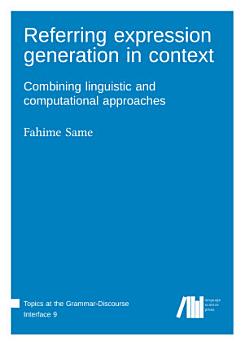Referring expression generation in context
À propos de cet e-book
This book offers a series of in-depth studies of the REG-in-context task. It thoroughly explores various aspects of the task such as corpus selection, computational methods, feature analysis, and evaluation techniques. The comparative study of different corpora highlights the pivotal role of corpus choice in REG-in-context research, emphasizing its influence on all subsequent model development steps. An experimental analysis of various feature-based machine learning models reveals that those with a concise set of linguistically-informed features can rival models with more features. Furthermore, this work highlights the importance of paragraph-related concepts, an area underexplored in Natural Language Generation (NLG). The book offers a thorough evaluation of different approaches to the REG-in-context task (rule-based, feature-based, and neural end-to-end), and demonstrates that well-crafted, non-neural models are capable of matching or surpassing the performance of neural REG-in-context models. In addition, the book delves into post-hoc experiments, aimed at improving the explainability of both neural and classical REG-in-context models. It also addresses other critical topics, such as the limitations of accuracy-based evaluation metrics and the essential role of human evaluation in NLG research.
These studies collectively advance our understanding of REG-in-context. They highlight the importance of selecting appropriate corpora and targeted features. They show the need for context-aware modeling and the value of a comprehensive approach to model evaluation and interpretation. This detailed analysis of REG-in-context paves the way for developing more sophisticated, linguistically-informed, and contextually appropriate NLG systems.
À propos de l'auteur
Fahime (Fafa) Same has an MA in Linguistics from Utrecht University and a PhD in Linguistics from the University of Cologne. Her primary research interests are in the areas of discourse and anaphora, Referring Expression Generation (REG), and corpus analysis. Her work explores various facets of the computational generation of referring expressions within discourse. This includes selecting appropriate corpora, identifying key linguistic features, and determining the most effective computational approaches for this task. Recently, she has concentrated on the human evaluation of computational REG models.







